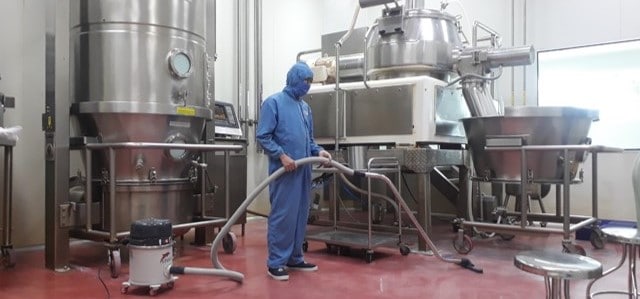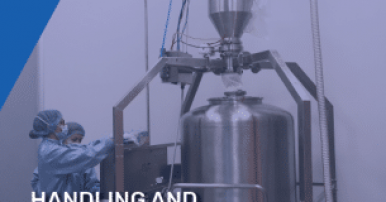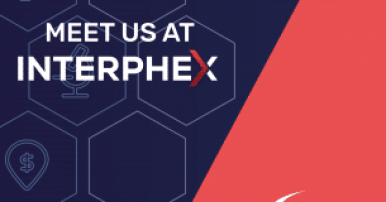In manufacturing industries, workers often handle and/or deal with hazardous dust and combustible dust, which are among the greatest threats to health and safety in the workplace. Preventing employees from coming into direct contact with these dusts is essential. That’s why guaranteeing frequent and appropriate cleaning procedures in the workplace is fundamental. Also, it depends on the material handled and the field of application. The main goal is to ensure the maximum level of health protection and security for all employees.
Two of the most prominent organizations in the USA, the OSHA (Occupational Health and Safety Administration) and the NFPA (The National Fire Protection Association), are working on a daily basis to regulate, implement and safeguard people’s protection in the workplace. In fact, they have defined specific safety standards and monitoring programs, and they keep striving every day to ensure increased levels of safety in the industrial manufacturing industries.
The purpose of this blog is to increase workers’ awareness on the threats they face in the workplace to their safety and health, while presenting Delfin Industrial’s specific solutions to these issues.
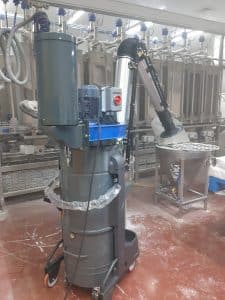
Hazardous and combustible dust: what is the difference?
As defined in the ANNEX II of the international law IEC 60335-2-69, hazardous dust is “non-radioactive and non-explosive dust which is hazardous to health if inhaled, ingested or in contact with the skin”.
Among the elements defining dusts’ level of hazard for human health are their features and the particles’ size. Generally, precisely because of their tiny size, volatile and fine dust can be particularly dangerous since they are small enough to be inhaled. However, at the same time, they are large enough to remain trapped in the lung tissue without being exhaled.
This can lead to different health issues for respiratory apparatus, such as asthma, and to even more serious diseases, such as cancer.
Some examples are toner dust, which contains carbon, resin, and iron oxides, asbestos, and chemical and pharmaceutical dust.
Combustible dust is defined by OSHA as “fine particles that present an explosion hazard when suspended in air under certain conditions.”
In other terms, combustible dust is fine material that has the ability to catch fire and explode under the following conditions:
- a) the dust must be combustible;
- b) the dust must be airborne and so contain sufficient oxygen to support combustion;
- c) the dust must have a particle size distribution that will propagate flame;
- d) the airborne dust concentration must be within the explosible range;
- e) the airborne dust must be in contact with an ignition source of sufficient energy.
A combustible dust hazard may be more frequent and common than you think. In fact, 70% of the dust handled or produced in manufacturing industries, under the right conditions, can lead to explosion. These risks involve all those industries that handle or produce dust from food, flour dust, dust from metals, chemical dust, plastic dust or pharmaceutical dust. This list is not exhaustive. However, to learn more about the features of the materials you process in your company or to have more information about the explosion risks of your combustible dust, you can visit the OSHA website.

THE DANGERS ASSOCIATED WITH COMBUSTIBLE DUST IN A MANUFACTURING ENVIRONMENT
The presence and the accumulation of combustible dust can lead to two distinct hazards: flash fires and explosions.
The first ones are determined by the presence of fuel (in our case, combustible dust), oxygen, ignition, and dispersion. It is only with the fifth element, confinement, that an explosion may occur.
HOW TO SAFELY COLLECT DUST
When dealing with harmful dust, it is essential to avoid direct contact and dispersion into the surrounding environment. This is only possible when having the appropriate cleaning and maintenance equipment, which depends on the specific features of a workplace.
Delfin has designed explosion-proof industrial vacuum systems for combustible dust and for hazardous dust in the different industrial manufacturing sectors.
Pharmaceutical industry
Pharmaceutical manufacturing is among the industries with the highest levels of risk due to the handling of different types of toxic, harmful and potentially explosive dust. In Pharmaceutical manufacturing it is essential to ensure the highest standards of hygiene, safety, and productivity for a safe and effective end-product.
To meet all these priorities and standards, Delfin has designed an innovative range of dust containment solutions that can be perfectly integrated into the different stages of the pharmaceutical production process.
Specifically, by installing the vacuum cleaners directly on the processing machineries, it is possible to remove dust directly from the source, consequently avoiding its dispersion in the surrounding environment and preventing its inhalation.
In addition, to ensure that the air released by the vacuum cleaner into the working environment is clean and free of harmful dust, Delfin vacuum cleaners are equipped with Absolute Hepa /H14 filters, with efficiency 99,995% and specifically designed to capture particles down to 0,18 Micron.
For a safe dust collection and disposal, industrial vacuum cleaners can be equipped with crimpable containment bags with gripper and high-sealing seals that allow the material to be discharged without any contact with hazardous dust.
The replacement phase of exhausted Hepa filters must also take place in total safety, protecting the operator from possible contact with dust.
For this reason, Delfin has designed the BAG-IN BAG-OUT system, which is closed and therefore completely safe. In fact, the replacement of the filter takes place inside a closed, see-through bag that prevents both the dispersion of the dust into the environment and the direct contact with the operators.
3d printing
In additive manufacturing, and specifically in the SLS (Selective Laser Sintering) and SLM (Selective Laser Melting) processes, the use of conductive metal dust requires dedicated and specific vacuum solutions. In fact, metal dust is conductive and, to prevent any threats to workers’ safety, it is fundamental to avoid its dispersion into the environment. Making this dust unharmful (unsintered) is an essential priority.
Delfin has designed a series of explosion-proof vacuum systems with inert technology. The potentially explosive material is vacuumed directly into an inert liquid inside the stainless-steel collection system. The liquid traps the dust making it harmless.
To learn more about industrial vacuum systems for 3D printing, visit our dedicated section and download our brochure.
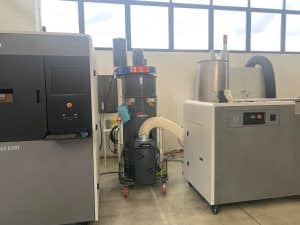
Food industry
In the food industry, all dust from solid organic materials (such as flour, custard powder, instant coffee, sugar, dried milk, grain, potato powder or soup powder), can lead to explosion risks, especially if accumulated in large quantities. To prevent such accidents, Delfin offers NFPA compliant solutions with stainless-steel construction, equipped with high levels of dust filtration (antistatic and HEPA H14 filters), complete grounding and FDA approved color-coded accessories. These accessories offer an extra level of safety, helping in the prevention of cross-contamination.
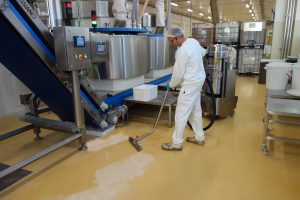
Safety and health protection are top priorities for Delfin and, for this reason, we work daily to offer tailored and cutting-edge industrial vacuum solutions.
Contact us to learn more about all the solutions that we can offer to help you improve your health and safety standards in manufacturing industries.

